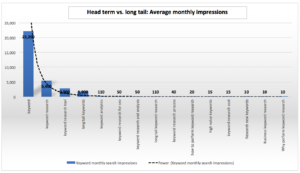Why perform Keyword Research
Any business planning to build its first, 5th, or 100th SEO strategy must begin thinking about how customers will find its product or service online. The company must begin by identifying keywords consumers will search online when looking for the product. This is called keyword research. Leaders of a business may ask, why perform keyword research? The answer is simple, if the keyword research and analysis part of the SEO plan is skipped, there might as well not be a plan at all. Performing keyword research for SEO will ensure high value keywords are identified that increase company exposure to the market.
How to execute
Once a business has learned the importance of keywords, it must ask how to perform keyword research. There are many keyword research tools available online for free. Here are a few of the popular ones: Google trends, ubersuggest, Adwords (need access), or simply type a query in the search bar and refrain from clicking search. It is important to make sure an organized keyword research process is followed. Here are a few important steps to follow:
- List the products/services the company sells. This will be the head term keyword list
- Use the tools listed to input the list created
- Export all variations of the original keywords
- Input all keyword into the Adwords keyword planner to determine estimated monthly volume.
- Sort through and eliminate keywords irrelevant to business or that have no search volume (note: low volume keywords aren’t always bad to have. These can still generate customers)
- Add keywords to site content where relevant
- Repeat
The list created may contain 50 keywords, or 1000+. Regardless of how many it includes, sorting the keywords into category buckets is a good idea to ensure everything is covered that is needed. This is also a good practice because it may help identify keywords that aren’t applicable to the business. It can also expose opportunity to research new keywords outside of the products or services sold by the business. When reviewing each keyword bucket, try to identify the long tail keywords within the list and determine if they are a good fit. A long tail keyword will be more  specific and typically include multiple words or a short phrase. These keywords can be high value and shouldn’t be left out of an SEO strategy. On the other hand, some long tail keywords may not generate enough impressions to make it worth including. Long tail keyword research should not be brushed aside. It takes additional time and may increase the keyword research cost if paying by the hour, but it is worth the value gained. It will put a business ahead of those that quickly throw together a site and SEO strategy.
specific and typically include multiple words or a short phrase. These keywords can be high value and shouldn’t be left out of an SEO strategy. On the other hand, some long tail keywords may not generate enough impressions to make it worth including. Long tail keyword research should not be brushed aside. It takes additional time and may increase the keyword research cost if paying by the hour, but it is worth the value gained. It will put a business ahead of those that quickly throw together a site and SEO strategy.
How often should this process be used
Finding and targeting high value keywords for the business is an ongoing process. A keyword that performs well today may act much different in six months. This brings up an important question, how often should a business perform keyword research? The answer is all the time. Whether it is a detailed dive into the industry or simply paying attention to Google or Bing’s suggestions when typing a query, always knowing how consumers are searching for the product will keep the business ahead of competition. Keeping up with algorithm changes and improvements to search is becoming increasingly important and highly relevant to the keyword research process. Focusing on how the search engine values the keyword and utilizes it is becoming as important as knowing what the users are searching. It’s near impossible to know what Google thinks of a keyword, but by keeping up on its latest releases and deeply analyzing what happens when a search occurs, businesses can stay ahead of the game.
Whats next
After all keywords have been identified and added to the content and all other relevant places, understanding how they perform in the real world becomes very important. Using keyword analytics tools such as Google Analytics will help you understand how people are getting to the site, their behavior when on site, and what actions are made. Over time trends will begin to appear leading to optimizations. This can also help assist in the continual process of researching new keywords. If impression or session volume shifts to a different category of keyword, this may be a sign that it is time to research new keywords around the shifting trend.
It’s important to reiterate that a successful SEO strategy requires constant attention to the market and ensuring the site is always utilizing high value keywords. The research process is ongoing and how successful the business is at it will play a huge role in gaining a competitive advantage over competition in the digital space.
